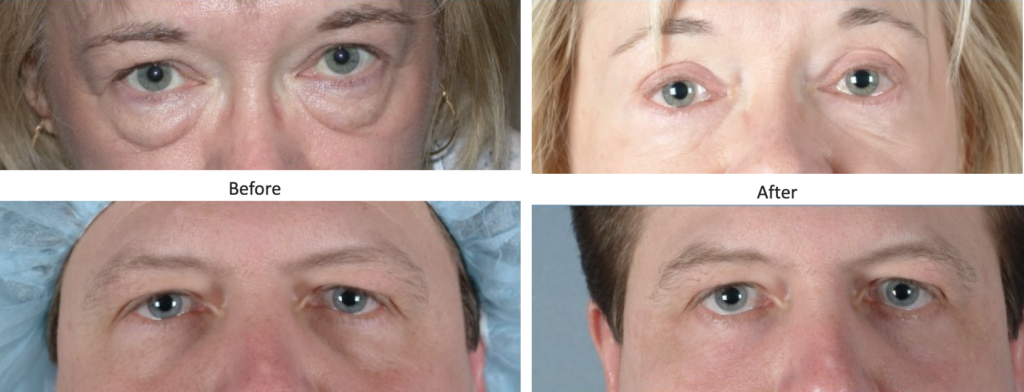Anesthesia Options for Blepharoplasty

As we grow older, our bodies begin to show signs of aging. Whether it be because of natural functions, sun exposure, or an outside force, sometimes this process can come prematurely. This can affect all areas of the body but is most prominent on the face.
When we think of cosmetic procedures meant to fix these signs of aging, most people would think of a facelift or fillers, as they are a common solution. However, other procedures focus on specific areas of the face that allow for more precise control. One of these procedures is blepharoplasty. Anesthesia Options for Blepharoplasty-
Table of Contents
What Is Blepharoplasty?
Blepharoplasty is a cosmetic surgery focused on the eyes. As we age, the eyes begin to droop and gain wrinkles, making us look even older than we are. This surgery is meant to correct those issues to restore youth.
During the procedure, excess tissue is removed from the eyelids to create a youthful appearance. It can be removed from either the upper or lower lid, or both. While both areas can be addressed at the same time, it is more common for patients to only want to fix one of the two.
There are two types of blepharoplasty, upper and lower. Upper eyelid surgery fixes crow’s feet and drooping skin, creating the younger look patients want. Lower eyelid surgery typically targets excess fatty tissue, which reduces the appearance of eye bags.
This procedure is mostly done for cosmetic reasons, but there are medical reasons it may be used as well. Sometimes when the skin begins to droop, it irritates due to the excess folds rubbing together. There can also be discomfort in the forehead due to the strain of the muscles trying to lift sagging skin.
When skin droops excessively, it can also cause problems for those who have to wear glasses or contacts for vision. All of these issues are also reasons someone may seek out a blepharoplasty procedure. This procedure is referred to as functional blepharoplasty.
Are There Side Effects?
Immediately after surgery, mild discomfort is common and can be treated with ice and pain medication prescribed by a doctor. During the first few days, patients can also expect swelling, some bruising, and the chance of the sclera to become bloodshot. There is also a chance the eyes may develop crusting, which can be treated with a warm compress
Dry eyes are also common and can be counteracted using artificial tear drops or ointment prescribed by the doctor. The eyes may also be sensitive to light, and tearing is common for several days after the procedure. It is also recommended to avoid any kind of straining, lifting, or heavy exertion for three weeks or more.
If the patient underwent general anesthesia for the surgery, there may be side effects from this as well. These include temporary confusion, dizziness, nausea, feeling cold, and a sore throat from the breathing tube. Most people who encounter any of these side effects only feel them right after the anesthesia, and they disappear quickly.
With local anesthesia, some side effects may occur. These include dizziness, blurred vision, headaches, numbness, or muscle twitching. Like general anesthesia, these effects are temporary and pass quickly during recovery.
What Anesthesia Do You Need?
For any type of surgical procedure, anesthesia is used to help keep patients calm and alleviate discomfort and pain. When deciding to use anesthesia, surgeons must look at the type of procedure being performed and how extensive this procedure is. This allows them to choose between two different types of anesthesia, depending on which is suited to the patient.
Local anesthesia is used on procedures that are simpler in nature and do not cover a wider area. This is administered to specific regions of the eyes in blepharoplasty using a needle and can be used in combination with sedatives. These extra sedatives can be given either orally or through an intravenous needle.
General anesthesia is used in procedures that are more complicated in nature, or when a patient is undergoing multiple cosmetic surgeries at once. This is given through IV and puts the patient to sleep for the duration of the surgery, wherewith local anesthesia the patient remains awake. How long the patient stays asleep depends on the complexity of the surgery itself, and can be anywhere from 20 minutes to a couple of hours.
When undergoing general anesthesia, extra steps must be taken before the surgery as advised by a doctor. This can include stopping certain medications, no longer eating or drinking after midnight, not wearing any makeup to the surgery, and making sure the patient has a caretaker to get them home and look after them after the surgery itself.
What Is the Cost?
The cost of blepharoplasty varies due to many factors. This can change based on where the surgery is taking place, the type of surgeon doing the procedure, and the facility itself. However, the cost can also be ranged depending on how many areas are being fixed within the procedure itself.
The price of an eye lift can range anywhere from $2,000 to $5,000. This covers anything from a simple procedure addressing a smaller area, to a more complicated procedure that tackles more areas of the eyes. The cost can also be incurred based on the operation suite needed for the surgery and can add up to $2,000 to the procedure.
Finding the Right Surgeon For You
When it comes to transformative plastic surgery, blepharoplasty in Atlanta helps to give their patients the youthful look that they’re seeking. Dr. DeJoseph is a triple board-certified surgeon who specializes in cosmetic eyelid surgery, making him a great choice. Alongside blepharoplasty, he can offer recommendations to patients about complementary procedures that will enhance the effects of the procedure.
Blepharoplasty in Atlanta is always looking to help patients regain their confidence in their daily appearance. To learn more about Dr. DeJoseph and schedule a consultation, please visit our website.
